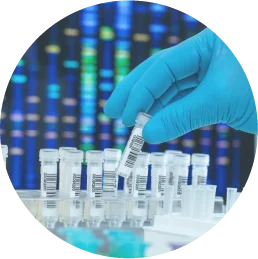New Year’s resolutions, whether unspoken or declared, are a common tradition that many people find helpful when setting goals. Most New Year’s aspirations have to do with health. Making new or renewed efforts to improve health can get you back on track and keep you motivated.
Life is busy, and it is easy to let preventative health appointments and screenings for common medical diseases lapse, but the consequences of doing so can be significant. As you consider health screenings, prostate cancer screenings should be at the top of your list, and we will tell you why.
Setting a Goal to Get Regular Health Screenings
Setting your New Year’s goal of improving your health starts with annual doctor’s visits. These scheduled appointments cover a wide range of health screenings that give you a road map for the coming year.
- Health assessment: An annual physical exam entails measuring blood pressure and oxygen levels, heart rate, and other vital signs. A blood test is typically done for a more in-depth look at your overall health.
- Cancer screening: Cancer is the leading cause of most disease-related deaths worldwide. For men over 50 and younger Black men, this is the time for a PSA test for prostate cancer.
- Vaccinations: Flu, shingles, and pneumonia shots may be indicated at your annual visit, so it’s a great time to update any vaccinations.
Do you struggle to set health goals and don’t know where to start? Begin your New Year resolving to improve your health by scheduling your annual doctor’s visit and getting a prostate cancer screening.
What Is Prostate Cancer?
The prostate, part of the male reproductive system, includes the prostate, testicles, and seminal vesicles. The prostate is about the size of a walnut and located below the bladder.
As men age, the prostate tends to increase in size, sometimes causing the urethra to narrow and decrease urine flow. This is called benign prostatic hyperplasia, which is not the same as prostate cancer.1 It is not clear exactly what causes prostate cancer, but like most cancers, abnormal cells divide and multiply more rapidly than normal cells do. Aside from skin cancer, prostate cancer is the most common cancer for men.
The Risks of Prostate Cancer
According to the American Cancer Society, prostate cancer is the leading cause of cancer death among men following lung cancer.2 Approximately 1 in 41 men will die of prostate cancer. The good news is that most men diagnosed with prostate cancer do not die from it.
Early detection means a better chance of successful treatment, but early detection requires regularly scheduled prostate screening. Often prostate cancer is confined to the prostate, and an active surveillance strategy is reasonable.3 Risk factors for prostate cancer are:4
Age
The odds of having prostate cancer increase significantly with age. Most cases of prostate cancer are found in older men over the age of 65, with few men under the age of 40 developing the disease.
Race/Ethnicity
Black and Caribbean men are more likely to develop prostate cancer at an earlier age and are at higher risk at any age. Asian, Hispanic, and Latino men are less likely to develop prostate cancer than white men.
Geography
Prostate cancer is more common in North America, northwestern Europe, Australia, and the Caribbean islands. It is less common in Africa, Central America, South America, and Asia. Increased screening opportunities in these countries could account for the geographical differences. Lifestyle factors could also play a role.
Family History and Genetics
Prostate cancer runs in some families, which suggests that there may be an inherited or genetic predisposition. But most prostate cancer cases occur in men with no family history. If you have a father or brother with prostate cancer, it doubles your risk of developing the disease.5
The Symptoms of Prostate Cancer
In the early stages of prostate cancer, there may be no signs or symptoms, lending importance to screening. If you have signs or symptoms, prostate cancer could be more advanced, so if in doubt, take the next step for confirmation of the diagnosis and treatment options. Some of the more common symptoms of prostate cancer:
- Trouble starting to urinate
- A weak urine stream that might start and stop
- Blood in the urine
- Blood in the semen
- Bone pain
- Losing weight without trying
- Erectile dysfunction
- Inability to completely empty the bladder
The Benefits of Regular Screening for Prostate Cancer
To encourage you to schedule regular prostate screenings, let’s look at the benefits:
- Detecting prostate cancer early and starting treatment reduces the risk of cancer spreading and metastasizing. Early detection can save lives.
- Screening can find prostate cancer before you have symptoms.
- Screening can lower the number of people that die from prostate cancer and reduce the number of men who may eventually need invasive treatment.
- A study found that a decline in prostate cancer screening was linked to an increase in advanced disease.6
- The five-year survival rate for men with prostate cancer confined to the prostate is nearly 100%.
A prostate-specific antigen (PSA) blood test is the first step in screening for prostate cancer. Medicare Part B (Medical Insurance) covers digital rectal exams and PSA tests once every 12 months for men over 50.7 You can get a PSA test at your annual doctor’s visit.
However, the PSA screening alone may not indicate if cancer is present. To increase the efficacy of PSA interpretation, at HALO Dx, we use PSA Density (PSAD) for more accurate results. Men with larger prostate glands may have higher PSA levels—PSAD adjusts for that.8 The doctor measures the volume of the prostate gland and divides the PSA number by the prostate volume.
HALO is Here to Help
At HALO Diagnostics, we realize that every patient is unique and so are their prostate concerns. If you have a prostate cancer diagnosis or a high-PSA result and want to learn more about prostate MRI, MRI-guided biopsy, or minimally-invasive treatment, please schedule a consultation with one of our prostate experts today. Or feel free to give us a call at 877-225-2831.
References
2 https://www.cancer.org/cancer/prostate-cancer/about/key-statistics.html
3 https://www.halodx.com/prostate/prostate-cancer-active-surveillance/
4 https://www.cancer.org/cancer/prostate-cancer/causes-risks-prevention/risk-factors.html
5 https://www.healthline.com/health/prostate-cancer/prostate-biopsy-alternatives#risk-factors
7 https://www.medicare.gov/coverage/prostate-cancer-screenings
8 https://www.cancer.org/cancer/prostate-cancer/detection-diagnosis-staging/tests.html




